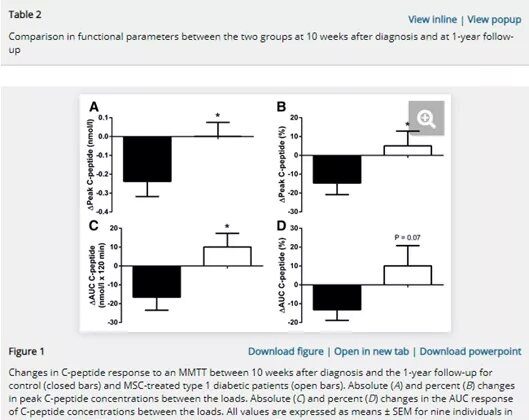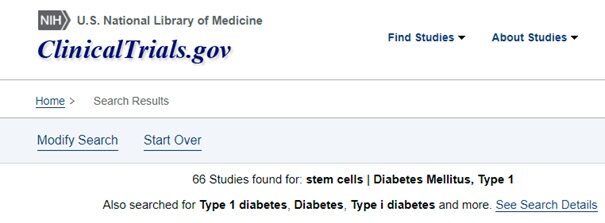Another stem cell drug for diabetes has entered clinical trials!
- Normal Liver Cells Found to Promote Cancer Metastasis to the Liver
- Nearly 80% Complete Remission: Breakthrough in ADC Anti-Tumor Treatment
- Vaccination Against Common Diseases May Prevent Dementia!
- New Alzheimer’s Disease (AD) Diagnosis and Staging Criteria
- Breakthrough in Alzheimer’s Disease: New Nasal Spray Halts Cognitive Decline by Targeting Toxic Protein
- Can the Tap Water at the Paris Olympics be Drunk Directly?
Another stem cell drug for diabetes has entered clinical trials!
Recently, the FDA approved a clinical trial application for a new drug (VX-880) for the treatment of type I diabetes with stem cells.
How effective is stem cell therapy for type 1 diabetes?
This is a kind of allogeneic stem cells used to treat patients with type 1 diabetes.
They can differentiate into pancreatic islet cells and secrete insulin, thereby supplementing the absolute lack of insulin in patients with type 1 diabetes.
The researchers said that the drug is to rebuild the function of pancreatic islet cells in patients with type 1 diabetes, including insulin production, thereby restoring its ability to regulate blood sugar levels.
The approved clinical trial is a non-blinded, uncontrolled phase 1/2 clinical trial. It is planned to recruit about 17 patients with type 1 diabetes with consciousness disorder and severe hypoglycemia, with the purpose of evaluating the safety and effectiveness of different doses of VX-880 Sex. Subjects need to receive long-term immunosuppressive therapy to prevent the body from immune rejection of the differentiated islet cells.
Stem cell therapy may have a major impact on patients with type 1 diabetes. It is reported that this new drug will start clinical trials in the first half of 2021.
Why use stem cells to deal with type 1 diabetes?
Type 1 diabetes, also known as insulin-dependent diabetes, has a significant decrease in the number of islet cells in the body and an absolute lack of insulin.
In the past, patients with type 1 diabetes could be treated by transplanting allogeneic pancreatic β-cells, but its curative effect is short-lived and requires long-term immunosuppressive therapy.
In addition, there is a shortage of donor sources. These shortcomings make its clinical application limited.
Stem cells have developmental plasticity. Stem cells from different tissues and organs can differentiate into islet-like cells and secrete insulin after induction.
In addition to differentiating into islet-like cells, stem cells can also migrate to the injured site and regulate the local microenvironment through the paracrine mechanism (exosomes), thereby promoting tissue regeneration.
In addition, since type 1 diabetes is an autoimmune disease, stem cells can also protect newborn islet tissue from damage through immune regulation due to the destruction of islet tissue by the autoimmune system [1].
How effective is stem cell therapy for type 1 diabetes?
From these successive clinical trials, it can be seen that stem cells have become a hot spot in the treatment of type 1 diabetes.
In recent years, various studies have bet on stem cells in order to achieve breakthroughs in the treatment of type 1 diabetes.
In 2015, a research team randomly divided 20 newly diagnosed adult type 1 diabetes patients into a test group and a control group.
The test group was given autologous mesenchymal stem cell transplantation plus insulin therapy, while the control group was given insulin therapy only and followed up for 1 year It was found that the plasma C-peptide level of the experimental group did not decrease or even increased.
The control group decreased significantly, and the experimental group did not have obvious side effects during the study period [2].

In April 2020, an article in “Science Translation Medicine” [3] found that the stem cells of diabetic patients after CRISPR/Cas9 gene editing were injected into type 1 diabetic mouse models to reverse diabetes in mice.

How far is stem cell treatment of type I diabetes?
Up to now, there are 66 clinical trials related to the treatment of type 1 diabetes with stem cells registered on the clinicaltrials.gov website of the National Institutes of Health, of which 18 have been conducted in China.
This tells people that multiple scientific research teams are using stem cells to overcome type I diabetes.

Type 1 diabetes is caused by the destruction of islet cells by the autoimmune system. Stem cells can not only differentiate into islet-like cells, secrete insulin, but also regulate the immune response, and treat type 1 diabetes at the etiological level, so as to get rid of the pain of lifelong insulin injections .
Although it is still in the research stage, many studies have shown that stem cells have a good therapeutic effect on type 1 diabetes.
It is believed that in the near future, stem cell treatment of type 1 diabetes will gradually move from the laboratory to the clinic, and effectively help patients.
Another stem cell drug for diabetes has entered clinical trials!
(sourceinternet, reference only)
Disclaimer of medicaltrend.org



